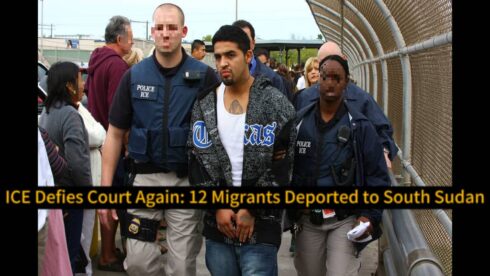ICE may have once again stepped outside the boundaries of lawful enforcement by deporting twelve migrants to South Sudan, despite a standing federal court injunction barring removals to the war-torn nation. Legal analysts and immigrant rights organizations allege that this deportation constitutes a blatant disregard for judicial authority.
Immigration and Customs Enforecment operations are currently under tight scrutiny, especially concerning nations with unstable regimes or ongoing armed conflict. South Sudan, plagued by civil unrest and widespread human rights abuses, was explicitly marked by the U.S. judiciary as a no-deport zone. Advocates argue that sending individuals back to such perilous conditions not only violates court rulings but also undermines international human rights commitments.
Migrants Allege They Were Deceived and Detained Abruptly
ICE agents reportedly used misleading tactics to round up the twelve migrants, telling them they were being moved to another state facility before boarding them onto a deportation flight. Several detainees, who remain anonymous for fear of reprisal, claimed they were denied the opportunity to contact their legal representatives or families.
ICE officials have yet to provide a transparent explanation for these allegations. However, immigration attorneys maintain that ICE’s actions breach multiple federal regulations, including those regarding detainee rights to due process and legal counsel. The absence of clear documentation on the deportation process has further fueled concerns of systemic abuse and evasion of oversight.
Judiciary Reacts Swiftly to Reports of Contempt
ICE has now drawn the ire of federal judges who view this deportation as a potential act of contempt. U.S. District Judge Maria Lopez, who originally signed the injunction against deportations to South Sudan, has reportedly demanded an emergency hearing to investigate ICE’s noncompliance.
Immigration and Customs Enforecment leadership may face serious legal repercussions, including sanctions or criminal referral, if proven to have knowingly disobeyed a federal court order. Legal scholars argue that continued defiance by federal agencies sets a dangerous precedent for executive overreach, threatening the balance of power and eroding trust in constitutional enforcement.
South Sudan’s Ongoing Crisis Ignored in Deportation Decision

ICE’s decision comes at a time when South Sudan is grappling with escalating tribal violence, famine, and a collapsed healthcare system. Human rights groups, including Amnesty International and Human Rights Watch, have condemned the deportations as tantamount to a death sentence for those returned.
ICE did not acknowledge the country’s fragile status in its public statements. By overlooking the humanitarian disaster in South Sudan, critics argue that the agency is not only indifferent to global humanitarian norms but also endangering lives by prioritizing removals over refugee protections and asylum considerations.
Trump Administration Faces Intensified Backlash
ICE’s actions have thrown the Trump administration into political turmoil, with progressive lawmakers demanding an immediate inquiry. While the administration previously promised to enforce humane immigration policies, critics now accuse the White House of turning a blind eye to egregious misconduct within ICE.
ICE’s independence from day-to-day executive control makes it difficult for the administration to micromanage operations, but the lack of transparency and accountability has stirred calls for legislative reform. Immigrant advocacy coalitions are mobilizing for congressional hearings and a possible overhaul of ICE’s mandate and practices.
Legal Experts Call for Structural Reform and Accountability
ICE’s growing pattern of defying judicial orders may indicate deeper systemic issues within the agency. Legal analysts argue that without structural reform, Immigration and Customs Enforecment could continue operating in a legal gray area, free from meaningful oversight and consequences.
ICE must be held accountable to the rule of law, experts say, or else risk becoming a rogue agency. Proposals now include the appointment of an independent Immigration and Customs Enforecment inspector general, stricter legislative oversight, and even dismantling and rebuilding the agency under a new, human rights-centered framework.














